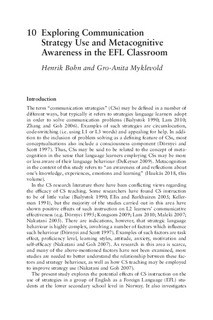Exploring Communication Strategy Use and Metacognitive Awareness in the EFL Classroom
Chapter
Published version
Permanent lenke
http://hdl.handle.net/11250/2600511Utgivelsesdato
2018Metadata
Vis full innførselSamlinger
Sammendrag
This study explores the impact of communication strategy (CS) teaching on students' qualitative and quantitative use of such strategies in the context of learning English as a foreign language in Norway. In addition, it examines students' metacognitive awareness related to CSs and the influence of proficiency level and motivation on the use of CSs. In the study, one group (n = 22) of lower secondary school students (age 15-16) received explicit CS instruction in four two-hour sessions over the course of a semester; a comparison group (n = 13) received no such instruction. An end-of-semester test was employed to examine their actual use of strategies, and questionnaires and interviews were used to examine their motivation for learning English and their metacognitive awareness of CS use. The results showed that the students who received explicit instruction employed communication strategies more frequently than the students who received no instruction. They also used a higher number of good-quality strategies. In addition, they appeared to be more conscious of the strategies that they utilised. No association between proficiency level and strategy use was found, but there was a modest but positive correlation between motivation and the employment of strategies.
Beskrivelse
CC-By-NC-ND

